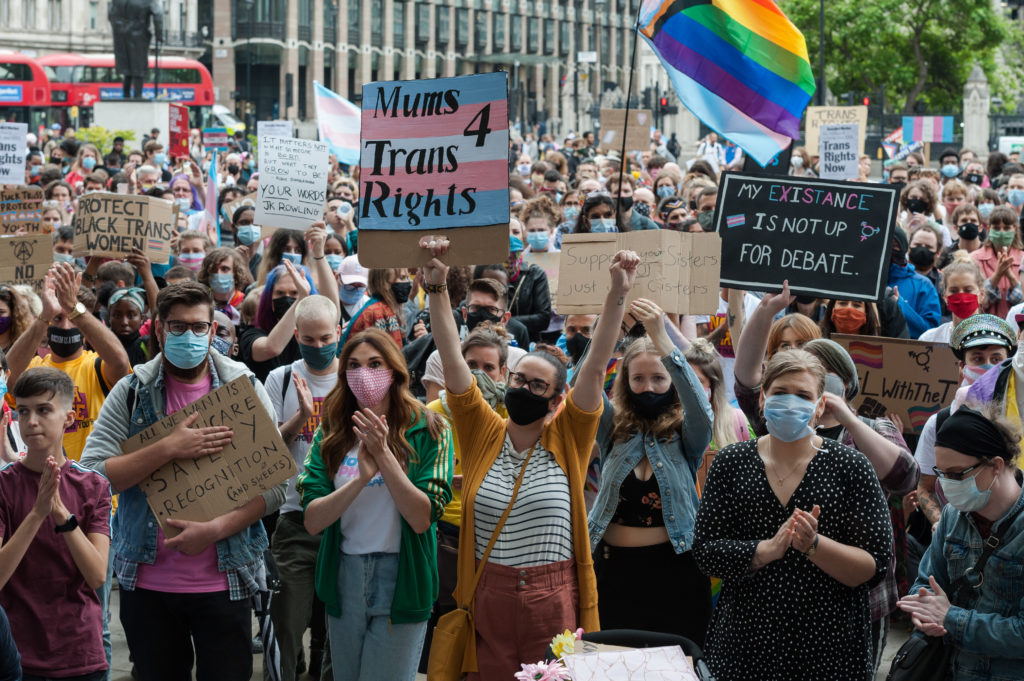From HIV to Covid-19: Fauci on his ‘Complicated Relationship’ with Larry Kramer
When Dr. Anthony Fauci, one of the most visible members of the White House Coronavirus Task Force, learned about the impact the virus could have on patients with underlying medical conditions, among his concerns was the health of a man he had grown to love and admire while battling a prior public health crisis.
“As soon as Covid-19 came, I immediately thought about my dear friend Larry,” Fauci, 79, said of the longtime AIDS activist and gay rights titan Larry Kramer.
When the coronavirus swept through New York City earlier this year, Kramer, who resided in Manhattan, was 84, HIV-positive and the recipient of a liver transplant. If he were to contract the novel virus, his odds of suffering a severe case of Covid-19 would have been high. But while the outbreak gave the two old friends reason to reflect on the early days of the AIDS epidemic — where they were both on the front lines — and discuss the current global health crisis, it was not Covid-19 that claimed the life of the outspoken activist in May, but pneumonia.
In the months following Kramer’s death, Fauci recalled some of their final conversations and the legacy of a man with whom he had a “complicated relationship,” though “at its foundation there was a great deal of affection.”
Related
His rage inspired a movement: Larry Kramer would not be ignored during the AIDS crisis
Kramer — who in 1982 co-founded the Gay Men’s Health Crisis, once the largest supplier of resources to AIDS patients across the country, and then in 1987 founded the grassroots activist group AIDS Coalition to Unleash Power (ACT UP) — never turned down a fight against federal officials tasked with overseeing public health policy. One of these officials was Fauci, who in 1984, as the AIDS crisis rose to prominence, became the director of the National Institute of Allergy and Infectious Diseases, a position he still holds today.
Kramer would regularly lambaste Fauci during the early years of the AIDS crisis in public statements, saying he was too inexperienced to lead the national institute. He also accused Fauci of ignoring the outbreak, similar to how former President Ronald Reagan had done so throughout much of his first term in office, when he refused to even acknowledge the existence of the then-novel virus.
In a 1988 open letter that called Fauci a “murderer,” Kramer wrote: “Your refusal to hear the screams of AIDS activists early in the crisis resulted in the deaths of thousands of queers.”
But many AIDS activists would later hail Fauci as a powerful mediator between them and the international scientific community. He has been credited by both advocates and scientists alike with increasing the amount of patients with access to experimental treatments for HIV and AIDS by amending the way the government conducts clinical drug trials.
“One important legacy from the HIV epidemic is how the FDA, clinical research and science were transformed by the urgency and activism of groups like ACT UP,” said Dr. Adrienne Shapiro, an infectious disease specialist at the University of Washington who is part of a national study exploring the impact Covid-19 has on those living with HIV.
Shapiro said much of the research she is now conducting would not have been possible without AIDS activists like Kramer and the initiatives led by Fauci throughout his career.
“Here we are leveraging this incredibly well-characterized, well-resourced cohort study that has been set up for 15 years, with people who have been followed for years and years, to ask questions about Covid. Data collection processes were already in place,” she said. “We didn’t have to reinvent the wheel.”
Related
How to survive a pandemic: HIV experts and activists on lessons learned
In both public health crises, Fauci has worked under presidents who were slower than he was to sound the alarm about the viral outbreaks. Whereas Reagan was accused of outright ignoring the AIDS crisis, President Donald Trump has been accused of “downplaying” the coronavirus pandemic so as not to cause widespread concern.
While Kramer was one of Fauci’s loudest critics during the early days of the AIDS crisis, Fauci said the late activist was one of his strongest defenders during the early days of the Covid-19 outbreak.
“He became kind of protective,” Fauci said, recalling that Kramer was livid when he heard the immunologist faced death threats and incendiary attacks over his calls for Americans to wear masks and follow social distancing measures during the initial months of the coronavirus pandemic.
“Larry wrote me this email, and he was really indignant,” Fauci said. “He would say, ‘These a——- are not treating you very well.’”
Fauci said there was a notable irony in their final conversations.
“Here was a guy who would not hesitate for a moment to criticize me,” he said, “but he didn’t want anybody else unjustifiably criticizing me.”
He recalled how Kramer would send him notes complaining about how his response to the pandemic was being criticized by some in the media.
“You’re killing yourself during this outbreak,” Kramer wrote, according to Fauci. “What a bunch of jerks.”
Related
Gays, lesbians and bisexuals at higher migraine risk, study finds
When the two discussed the pandemic on the phone, Fauci said it felt as if Kramer “really was like my old friend being protective of me.”
But the leading immunologist’s reputation was the last thing on his mind when he spoke to his once-toughest critic after learning what the pandemic was capable of inflicting on those with pre-existing health conditions.
“I have always been very concerned about Larry,” Fauci said, adding that he called Kramer as Covid-19 cases began to soar in the U.S., to ensure his safety: “I got on the phone with him, and I said, ‘Larry, you’re not going to like this, but here’s what you’ve got that’s a problem: You’re 80-something-years old, you have HIV and you have a liver transplant.”
Like millions of other Americans, Fauci was trapped in a battle of words, trying to convince his friend to focus on what he felt was the biggest issue at hand.
“I told him, ‘I know you like to be up and about, but you’ve really got to hunker down until this thing blows over,’” he remembered telling him. “I joked about it. You know, I’m not so young myself. I said, ‘We old guys, Larry, us old has-beens, we’ve got to take care of ourselves.’”
Now, four months after Kramer’s passing, Fauci said the activist’s legacy and indefatigable tenacity live on. Whether it’s the coronavirus or another novel virus that sweeps the nation, the country’s top doctor said he will always be guided by the spirit — and the unending criticism — of his “dear friend.”

